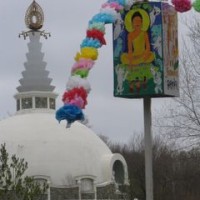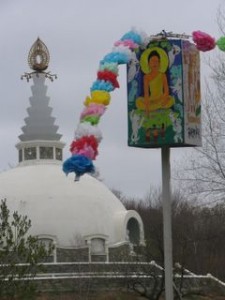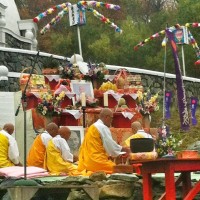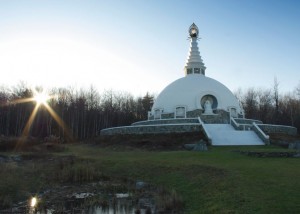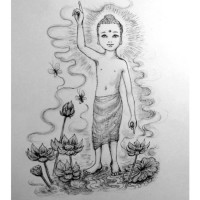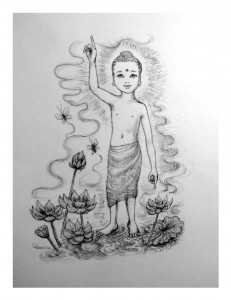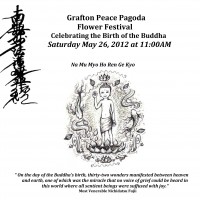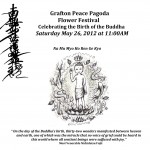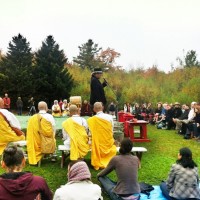
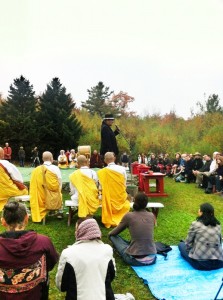 Speech by Dennis Banks at the Grafton Peace Pagoda 20th Anniversary Celebration, October 5th, 2013
Speech by Dennis Banks at the Grafton Peace Pagoda 20th Anniversary Celebration, October 5th, 2013
I got up pretty early this morning. It was very foggy. My granddaughter said “Grandpa, where are you going?” I said “I’m going to go see Jun san.” She said “tell her I said hello. I’m going back to sleep!”
I don’t know how many years ago we came here. With a young boy named Daijiro. I called him my son. We came here to see Jun san. Before, there was only a little place to pray in some buildings over here. We started talking to the crew that was here picking rocks. You couldn’t really shovel too far down without running into rocks or the tip of a huge boulder. We spent a week here. I will remember that all my life. And I never came back until it was completed. I was waiting! Waiting on the sidelines, “is it done yet? Have you moved the rocks!?”
There are a lot of cars [here today]. This is the most cars I’ve seen down here. Coming up here I thought for a moment, ‘my God, are we close to a Casino!?’ I told Julie—I told Charlie who was our driver, “either there is a temple up ahead or a casino! Either one would do me good!”
I’ve enjoyed many years—most of my adult life, 3/4s of my adult life, I‘ve been associated with the words Na Mu Myo Ho Ren Ge Kyo and the people that chant them. It began so many years ago in 1956 in a place called Tsunagawa. I was in the military at that time and they woke us up very early because there was going to be a huge demonstration against the base. People were protesting the planned expansion of the runway. They issued us arms to protect the base. During this day I was assigned a spot near where the protesters were gathering and praying. There was myself and about 1500 military personnel around the perimeter—on the inside of the perimeter of the base. Every ten feet there were some military personnel with their weapons. And there was a cyclone fence about ten feet from us. And then there was Japanese military and Japanese police. And then there were the monks. This was the first time I’d heard people chanting the words Na Mu Myo Ho Ren Ge Kyo. And then something happened and the police rushed the students. There were 1000s, perhaps 5 or 6 thousand people that came marching. We heard that from a great distance. They were chanting Na Mu Myo Ho Ren Ge Kyo. I was getting scared! I was getting chilled— not cold, just it was very impressive. For a moment I thought: ‘I should be over there [on the other side of the fence].” Because what was about to happen was that the Police rushed all the people that were gathered there and the monks were sitting down and praying. And they started hitting the monks, hitting them with their clubs, hitting them on their heads. It sounded like coconuts. And that’s when I couldn’t— I had chosen the military to be my career. But it was that incident where I realized I didn’t want to be part of the U.S. Military. I am Anishinabe. I am Ojibwa. I am from the land of the Ojibwe People. That is who I am. That’s who I was when I was standing there at Tsunagawa. I was Nowa Cumig! Nowa Cumig ndjishnikaaz. That is my name. Nowa Cumig. I’m also known as Dennis Banks, but at that moment I was Nowa Cumig. And I felt I did not want to participate in the destruction of these people, or any other human being. And so I ended my eight years in the military and never went back. And now I am with Na Mu Myo Ho Ren Ge Kyo. I am on this side. And I feel very great. I feel honored to be part of Nipponzan Myohoji. I feel great to be part of a group of human beings who care about this Earth, who care about each other, who extend the hands of friendship to each other. I feel great because I’ve been raised in a society that is gated. There are gates all around. I’ve been raised that the whites were here and Native People were locked up in the schools and the boarding schools— of which I was one of them. And the Blacks were being trampled on, kicked… Dogs– I watched those scenes. I remember Bull Connor using his dogs on the people there protesting against racism and discrimination. There is an ugly history of the American experience. There is an ugly history of people who have committed very bad deeds. And in the many words of the treaties there are words that say “if there exist bad men amongst our people, bring that man forward and we will expel them from the reservations. If bad men exist…” They knew bad men existed—we knew it—and we insisted that the language be very clear: “if bad men exist.” When I was in Japan at Tsunagawa, I fit the description—I filled those shoes—of the bad man. But inside me I could not commit a most…. I could not follow the orders. “What should we do if they come over that fence?” And the order was to shoot them. And Sergent Johnson asked “do we shoot to maim or to injure?” He said “no, you shoot to kill.” This was a peacetime order, given to us, to shoot to kill. People who were defending their own land! Stories and scenes raced through my mind that I was living something that had happened before in my history, on our lands in America… that bad men did exist.
So when I met Nipponzan, they never asked for any of our land. They never carried the Bible like the missionaries who came to our lands. Now we have the Bible, they have our lands! There was something wrong with that scene! And none of our people act like Christians. I mean they get down and pray. But at the end of the day we are Anishinabes; we are Lakotas, we are Onondagas, we are Mohawks, we are Senecas. We are who we are, born with the DNA of this Earth. That is our DNA—this Earth. And it pains me when I see destruction.
And I remember during 1988, we ran through this place in Japan where they were building this nuclear facility. And then two years ago, that same place where we ran through, where Emmet Eastman said “You shouldn’t be doing this! Something bad is going to happen! You don’t know the power of Mother Nature. Mother Nature can take it away from you. Maybe an Earthquake might happen and it will come crashing down!” And all the king’s men and all the king’s horses can never put it together again. That’s the danger that I’ve seen at Fukushima. I was there. I was there also two years ago, and a year ago. I’ve been many places with Nipponzan. I’ve met many good people. And I have not met one bad man amongst them. Nor do I sense that there is a bad man amongst this crowd. That’s a good feeling for me. I feel safe. I feel that there is not a target on my front or back. And I can lift my hat off and my hair—my scalp—will be safe.
And I had the great honor of travelling with Nichidatsu Fuji, Guruji. He became my mentor. And as the South Dakota prison officials took me to their prisons, I would pray. I would pray to the Great Sprit and I would end my prayer with Na Mu Myo Ho Ren Ge Kyo. And I received a very sad message from the guards that a man called Nichidatsu Fuji had passed away. And it grieved me. It made me feel sad that I could not be with him. Because he sent me to those mountains in India. He sent me to those mountains in Sri Lanka, where Pagodas were up there. That’s why I feel that my life has been strengthened by my travels with the monks and nuns of Nipponzan Myohoji. I will travel with them forever wherever I go. I have in my home a temple. I have four drums ready for Jun san to come and visit. Because I know someday she will be there and she might bring visitors, so I have the extra drums. So to Kato Shonin and all the monks and nuns of Nipponzan Myohoji I owe a great deal to you. I have lots of faults, but ingratitude is not one of them. I am very thankful. Because you have done more to save my life than I have done to build your Pagodas. You have made me very strong inside. I think that is what is important. So I would like to borrow a drum. I am going to sing a song. [He sings].
I made many friends in the East here. Jim Torren is one of them. I know he is in the audience here someplace. He has given me strength. And many people have touched my life more than I have touched theirs. And they have given me strength. You know it was kind of drizzling when I first came over here. And I said “if they have any power, if this crowd has that power, they will stop this drizzle.” And I want to say thank you — migwetch [thank you]—for that.
I have—military speaking—I have five stars on my lapel here. People ask– the TSA agent [transportation safety administration] agent asked me this morning, he said “what is that for? Are you a general?” I said “no.” I said “this is the quality of my life.” That’s what it represents, the quality of my life. I had one star when I first met Jun san. And as I prayed and visited the temples, I would get more strength. And these stars began to fill up. It means the quality of my life: like a five star hotel or a five star restaurant, that’s who I am. I’m a five star Anishinabe. That’s all I am. I harvest wild rice. I make maple syrup. And I fish. We fish with nets—big long nets—guaranteeing that I get a fish. My sons fish with a rod and reel. Sometimes they get out of the boat and I say “catch anything?” Not today. Sometimes I get out of the boat and they say “Dad did you get anything?” I say, “well I got about two hundred fish!” So that’s the quality of my life. I have 20 children. 20 children. Don’t go “Ah!!” We are supposed to have 20 children. There were maybe 10 million Native Americans here when Columbus landed. And through the reduction of our population because of diseases and wars and massacres, I felt that the least I could do would be to help bring back the population! And people say “all by the same woman?”… I say “wait a while… All by the same Man!” So that’s my job. It’s good to see everybody around here. As I said I was here before the Pagoda was here. And I’ve been in Japan before a lot of Japanese people were born. And I tell them that. I say “I was here before you guys were here. You can’t say this is your country without saying I’ve been in your country.” I’ve travelled Japan, from northern Hokkaido to all the islands—not all of them. The major ones. Running and walking. And I walked across the United States 7 times. Ran across with relay runs 6 times. Travelling with the monks and nuns in Sri Lanka, India, and Japan. In the United States, Jun san walked across the State of South Dakota in mid-winter, praying outside in the storm. And the prison guards went down there to ask her to come inside. She said “no, I will stay out here.” Jun san: migwetch, migwetch, migwetch. Everyone else: thank you for being here. I know some of you, I’ve never met you before. My name is Dennis Banks. I am also better known to my community as Nowa Cumig. Nowa Cumig means “in the center.” Indijinicas means “that’s my name.” Nowa Cumig ndishnikaaz. Na Mu Myo Ho Ren Ge Kyo (3times).
Read More...
